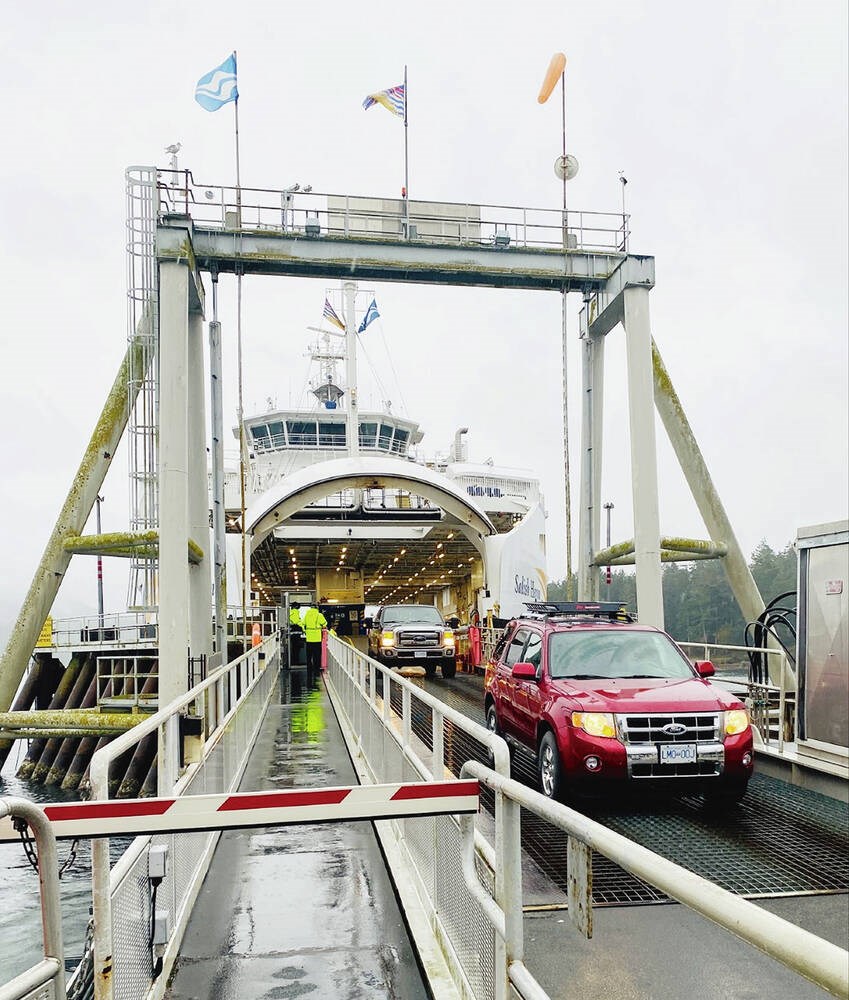After Pender Island-bound vehicles were left behind in Swartz Bay on a Thursday afternoon sailing last week because the Salish Heron had reached its weight limit, B.C. Ferries has announced it is seeking permission to carry an extra 150 tonnes on the ferry, its newest vessel.
The request to Lloyd’s Register would allow the ferry to carry the additional weight in sheltered waters, such as the vessel’s new route between Swartz Bay and the Southern Gulf Islands. Lloyd’s classifies and certifies vessels and can approve special requirements for ships.
The request is expected to take a few weeks to consider, B.C. Ferries spokesperson Astrid Chang said Wednesday.
At the same time, B.C. Ferries is looking at swapping the Salish Heron for another vessel that’s better able to carry heavier loads of commercial traffic, she said, while working to manage weight coming onto the ferry.
An update on a potential swap may come in a week or so.
Passengers in personal vehicles were shocked when the Salish Heron sailed off with open deck space on Thursday, and they were forced to wait more than four hours for the next sailing.
A higher-than-usual number of commercial vehicles were on that sailing, Chang said, which meant the vessel reached its weight limit before the deck space was filled.
Commercial trucks do not have priority but typically show up extra-early at the terminal to ensure they are able to board.
The Salish Heron has been in service on its route for less than one month, starting on Oct. 11. It was brought in to replace the Mayne Queen, which retires on Nov. 20.
The Salish Heron weighs 48 tonnes more than the three older Salish-class ferries as a result of upgrades to the rescue boats, as well as weight differences in steel and other material used to build the Heron, Chang said.
B.C. Ferries will meet with the Southern Gulf Islands ferry advisory committee to answer questions about the ferry, she said.
Meanwhile, some Pender Island businesses say they are frustrated that they can’t count on the ferry to handle demands from commercial and personal traffic on a regular basis.
“They bought the wrong boat for the job,” said Geoff Martin, owner of the delivery service Pender Courier.
The Swartz Bay-Southern Gulf Islands route is known for being busy, and residents eagerly awaited the arrival of the new ferry. “[But] they can’t take a full load of vehicles,” Martin said.
Martin said his drivers must often line up at Swartz Bay about 1 p.m. to secure a space on the 2:20 p.m. sailing, taking up time that could be used for filling more orders for customers. “We have to be there just to be sure [of boarding].”
The vessel is loaded on a first-come, first-served basis, based on the ticket time stamp and the available space on the ship, Chang said. “When vehicles arrive in the terminal, the crew develops a loading plan based on the size and type of vehicles in the lineup and the ship is loaded accordingly.”
On Friday afternoon, B.C. Ferries crew members were in a small boat checking draft lines on the ferry’s hull to compare them with electronic draft gauges, which determine how deep a vessel can safely be immersed in water.
There were three double-units of commercial vehicles carrying what appeared to be gravel or other road material on that sailing, Chang said. Vehicles are not weighed prior to loading.
The Salish Heron features a restaurant, something not needed on the 40-minute trip, Martin said. “We need space for vehicles.”
Martin sends three 25-foot-long trucks to Swartz Bay three times a week and a van on a fourth day to pick up a wide variety of goods.
That includes medical supplies for clinics, goods for hardware stores, carpets, furniture, pharmaceutical supplies, including time-sensitive prescriptions, pet food and veterinary items, and building supplies.
Mike Gray, part-owner of the Tru Value Foods supermarket on Pender Island, is hoping the Heron will be replaced with a lighter-weight Salish-class vessel.
Another Salish-class vessel filled in on the route a few years ago and there were no issues with vehicles being left behind, Gray said.
Gray questioned how the system would cope in the busier summer season, when the population on the islands increases and visitors pour in.
He suggests assured loading at Swartz Bay for the commercial vehicles now forced to arrive early at the terminal to secure a place on board.
He praised B.C. Ferries for its safety measures — such as checking the draft lines — but said “we need to have a ferry system that is going to work for everybody.”
Braedon Bigham, owner of Braedon’s Big Digem Excavating and Trucking, said the new ferry’s weight issues have “just been a total disaster,” in addition to late sailings. “It’s very frustrating to try to run a business and make a plan when you don’t know what to actually expect.”
The company brings aggregates to Pender daily, taking one to four trucks on the ferry, he said.
>>> To comment on this article, write a letter to the editor: [email protected]



